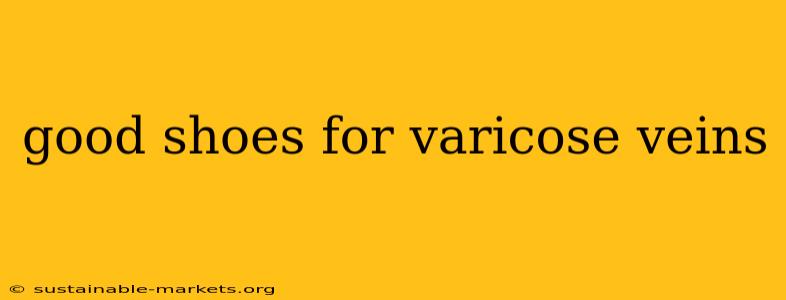Varicose veins, those unsightly and sometimes painful bulging veins, often worsen with prolonged standing or walking in uncomfortable footwear. Choosing the right shoes can significantly impact your comfort and potentially help manage your symptoms. This guide will explore the key features to look for in shoes designed to provide relief and support for those living with varicose veins.
Understanding the Impact of Shoes on Varicose Veins
Poor footwear choices can exacerbate varicose veins by:
- Restricting blood flow: Tight shoes, especially those with high heels or narrow toes, can impede circulation in your legs and feet, worsening venous insufficiency and potentially leading to increased pain and swelling.
- Lack of support: Inadequate arch support and cushioning can put extra strain on your legs and feet, increasing pressure on your veins and exacerbating varicose vein symptoms.
- Poor posture: Uncomfortable or improperly fitting shoes can lead to poor posture, which in turn affects blood circulation and puts additional stress on your veins.
Key Features of Good Shoes for Varicose Veins
The ideal shoe for someone with varicose veins offers optimal support, comfort, and circulation. Here's what to look for:
1. Proper Fit and Sizing
- Adequate width: Avoid shoes that are too narrow, as they constrict blood flow. Opt for shoes with a wide toe box to allow your toes to spread naturally and prevent pressure points.
- Correct length: Ensure the shoes are not too short or too long. Proper length prevents rubbing and blisters, which can further hinder circulation.
- Adjustable closures: Look for shoes with laces, straps, or Velcro closures to allow for a customized fit and adjustability throughout the day, accommodating any swelling.
2. Supportive Features
- Good arch support: Shoes with well-defined arch support help distribute weight evenly across your feet, reducing strain on your legs and improving posture. Consider orthotics if needed.
- Cushioned insoles: Cushioning absorbs shock and reduces pressure on your veins, particularly during prolonged standing or walking. Look for memory foam or gel insoles for optimal comfort.
- Low to Moderate Heels: High heels should be avoided as they restrict blood flow and put extra pressure on your calves. A low or moderate heel (less than 2 inches) provides better support and promotes better blood circulation.
3. Material Considerations
- Breathable materials: Opt for shoes made from breathable fabrics such as leather, canvas, or mesh. These materials allow for better air circulation, helping to prevent overheating and sweating, which can worsen varicose vein symptoms.
- Avoid synthetic materials: Synthetic materials can trap heat and moisture, potentially leading to discomfort and irritation.
Recommended Shoe Types for Varicose Veins
Several shoe types are generally well-suited for people with varicose veins:
- Walking shoes: Designed for comfort and support, walking shoes typically offer excellent cushioning, arch support, and breathability.
- Athletic shoes: Similar to walking shoes, athletic shoes often provide good support and cushioning, but make sure they have a wide toe box.
- Comfortable sandals: Choose sandals with good arch support and adjustable straps for a secure fit. Avoid flip-flops, as they offer minimal support.
- Slip-on shoes: Slip-on shoes with good cushioning can be a comfortable option, especially for those who experience swelling.
Beyond Footwear: Additional Tips for Varicose Vein Management
While choosing the right shoes is crucial, remember that managing varicose veins involves a holistic approach:
- Regular exercise: Gentle exercise, such as walking or swimming, improves circulation.
- Elevation: Elevate your legs periodically throughout the day to reduce swelling.
- Compression stockings: Compression stockings can significantly improve circulation and reduce symptoms. Consult your doctor for appropriate compression level.
- Healthy diet and weight management: Maintaining a healthy weight reduces stress on your veins.
By combining appropriate footwear with a healthy lifestyle, you can significantly improve your comfort and manage your varicose vein symptoms effectively. Remember to consult with your doctor or a podiatrist for personalized advice and treatment options.

